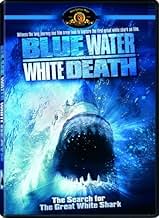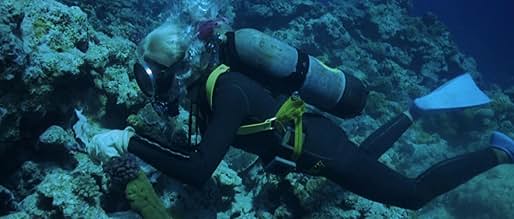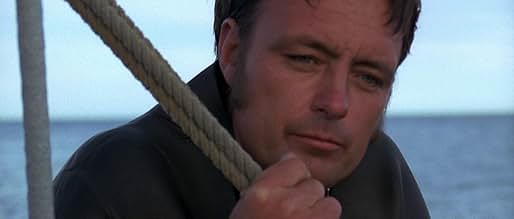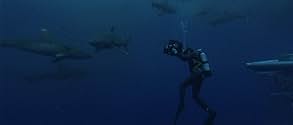Bleue est la mer, blanche est la mort...
Original title: Blue Water, White Death
- 1971
- Tous publics
- 1h 39m
IMDb RATING
7.1/10
483
YOUR RATING
Documentary focusing on great white sharks.Documentary focusing on great white sharks.Documentary focusing on great white sharks.
Stuart Cody
- Self
- (as Stuart R. Cody)
Peter Lake
- Self
- (as Peter A. Lake)
Valerie Taylor
- Self
- (as Valerie May Taylor)
Stan Waterman
- Self
- (as Stanton A. Waterman)
- Directors
- Writer
- All cast & crew
- Production, box office & more at IMDbPro
Featured reviews
Peter Gimbel and his team were the first to introduce me to SHARKS, when I watched this Epic Documentary. Since then, my life has never been the same again.
Sharing this incredible journey in search of the Great White Shark, Gimbel and his team have managed to capture some of the most incredible and memorable Shark Scenes that will live in your memory. i have watched it hundreds of times.
a True Masterpiece!!
Sharing this incredible journey in search of the Great White Shark, Gimbel and his team have managed to capture some of the most incredible and memorable Shark Scenes that will live in your memory. i have watched it hundreds of times.
a True Masterpiece!!
10PrncssG
Although I was young when I saw this movie, it has stuck with me all through the years. This is the movie that spawned my interest in sharks! I praise the makers for such a wonderful idea, too bad it got lost in all the Jaws "wake".
In 1969 Peter Gimbel set off on the First ever Expedition to Film The Great White Shark. His Team included other World famous underwater Photographers: Stan Waterman, Ron & Valerie Taylor, and also Shark Attack Survivor Rodney Fox.
Their search for the Great White lasted for 9 months and it took them from South Africa to South Australia. A lot of the footage that was Filmed had never been seen before. Some highlights like the dives with the feeding Oceanic Whitetips, and the final encounter with the Great White Shark are simply awesome.
This Documentary is an All Time Classic and is a Tribute To Both the Expedition Team and to the Sharks.
Their search for the Great White lasted for 9 months and it took them from South Africa to South Australia. A lot of the footage that was Filmed had never been seen before. Some highlights like the dives with the feeding Oceanic Whitetips, and the final encounter with the Great White Shark are simply awesome.
This Documentary is an All Time Classic and is a Tribute To Both the Expedition Team and to the Sharks.
It's amazing that when this movie was made, no one has ever filmed a great white before. And it's only been about 40 years since this movie was made.
When I first started taking scuba diving lesson, this movie was all the rage of town. There just wasn't any movie that had shark cage in it before this one. I think this was also the first movie to feature "chumming" technique to lure the sharks. My friends were telling me how huge the sharks were. Later I found out that it wasn't so big, but still it's a really big fish. Did Peter Benchley get his idea from this movie when he wrote "JAWS" ?
This was a ground breaking movie that raised the bar on underwater documentary features. In every underwater documentary there's little bit of influence from this movie. It's also amazing how much more we've learned in such a short time since this movie was made, mostly due to ubiquity of underwater filming.
A very important movie historically in the annals of underwater documentaries.
When I first started taking scuba diving lesson, this movie was all the rage of town. There just wasn't any movie that had shark cage in it before this one. I think this was also the first movie to feature "chumming" technique to lure the sharks. My friends were telling me how huge the sharks were. Later I found out that it wasn't so big, but still it's a really big fish. Did Peter Benchley get his idea from this movie when he wrote "JAWS" ?
This was a ground breaking movie that raised the bar on underwater documentary features. In every underwater documentary there's little bit of influence from this movie. It's also amazing how much more we've learned in such a short time since this movie was made, mostly due to ubiquity of underwater filming.
A very important movie historically in the annals of underwater documentaries.
The wealthy Peter Gimble, model for Mr. Hooper of Jaws, hires a ship and a crew and staffs it with a truly mixed bag of professional underwater naturalists and photographers (and one folk singer) and sets off in pursuit of the great white shark. By the film's midpoint, cast and crew are in open mutiny. Peter Mathiessen, hired as voyage historian, thought the product of the trip would be the world's most expensive home movie but it is considerably more interesting, detailing in surprisingly vivid terms some real highs and lows for a trip that is part carnival, part nature study. Contrary to expectations, the most striking sequence involves not a great white shark but a group of sharks (primarily blues) feeding on a sperm whale carcass. By exiting the shark cages and photographing the feeding up close, the divers raised the bar considerably on this kind of filming. There are also memorable moments as when Stan Waterman and Valerie Taylor struggle through high seas to get back aboard the boat and Mr. Waterman promises the cameraman that if he ever films them struggling like that again without helping them, he will find himself in the water with them. The sequences involving the great white are not surprisingly very striking. I suspect there was a little after-action photography added to the sequence showing Peter Lake trying to cut the rope holding the great white to his cage. A minor point in a great film. There are also some great moments under the credits, my favorite being Stan Waterman describing how to drive off a shark with a SCUBA knife. A real treat if you ever get to see this.
Did you know
- TriviaOne of the few documentaries shot in the wide screen 2.35:1 format.
- Quotes
Peter Gimbel: Now I want to tell you very quickly, what we're trying to do off Durban. We're looking for the animal that I think is considered to be the most dangerous predator still living in the world - the Great White Shark - which attacks the carcasses of killed whales in the Indian Ocean on the whaling grounds off here and, in the last ten days has taken five Sperm Whales over forty feet in length and removed from them all the meat down to the spine in a matter of six or seven hours.
- ConnectionsFeatured in Hunt for the Great White Shark (1994)
- SoundtracksCome Along
Written by K. Michael Burke
- How long is Blue Water, White Death?Powered by Alexa
Details
Box office
- Gross US & Canada
- $539,488
- Runtime
- 1h 39m(99 min)
- Sound mix
- Aspect ratio
- 2.35 : 1
Contribute to this page
Suggest an edit or add missing content


















